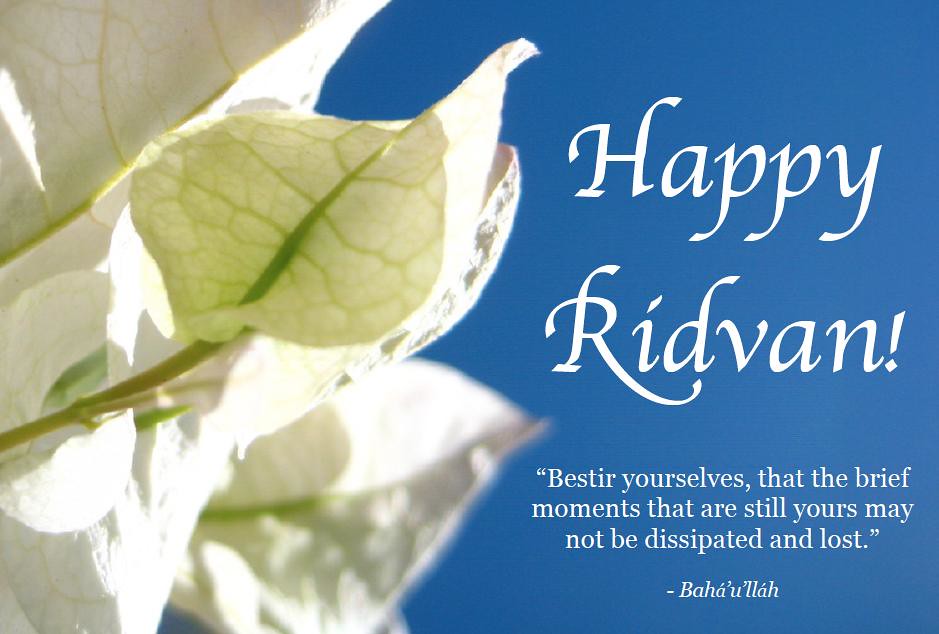The Ninth Day of Ridvan is not merely a date on the Bahá’í calendar; it symbolizes a profound moment of spiritual significance and renewal within the Bahá’í Faith. As part of the Ridvan Festival, which spans twelve days from April 21 to May 2, the Ninth Day marks a pivotal juncture in the founder Bahá’u’lláh’s declaration of His mission in 1863. This article seeks to elucidate the layers of meaning encapsulated within the celebration of this sacred day, exploring its implications for spiritual growth, community unity, and global outreach.
Observing the Ninth Day of Ridvan requires a multifaceted understanding of both its historical and theological contexts. The day commemoratively represents the moment when Bahá’u’lláh publicly proclaimed His divine appointment, thereby establishing a new covenant in the annals of spiritual evolution. It is a day on which Bahá’ís gather in reverence, engaging in prayers, communal activities, and reflections that spotlight the transformative potential inherent in Bahá’í teachings.
One of the most significant aspects of this celebration is its focus on unity and inclusivity. The principles set forth by Bahá’u’lláh espouse a vision of global brotherhood—a recognition that all humanity is interconnected. This ethos offers a counter-narrative to the divisive tendencies prevalent in much of contemporary discourse. Observing Ridvan, particularly the Ninth Day, encourages participants to transcend personal differences and embrace a collective identity grounded in faith and unity. In doing so, individuals come to perceive their personal spiritual journeys as intertwined with the broader tapestry of human experience.
Furthermore, the Ninth Day of Ridvan encapsulates a call to action. It serves as an invitation for Bahá’ís to reflect on their responsibilities to engage in service to others. This call extends beyond the confines of the Bahá’í community, fostering a spirit of altruism and compassion that can inspire social action. The teachings of Bahá’u’lláh profoundly emphasize the importance of contributing positively to society, prompting followers to become effective agents of change amidst the challenges of modernity. This commitment to service is grounded in the understanding that spiritual fulfillment often arises from the act of giving and the cultivation of selflessness.
The observance of the Ninth Day is also infused with symbols and rituals that resonate deeply within the Bahá’í belief system. During this time, community gatherings may incorporate elements such as shared meals, prayers, and evocative musical performances, which act as conduits for spiritual elevation. These practices not only serve to honor the day but also to forge connections among participants, thereby reinforcing the collective spirit of the community. The communal spirit of Ridvan invites individuals to express their hopes, dreams, and aspirations in a harmonious chorus, fostering a sense of belonging and mutual support.
Moreover, the observance of the Ninth Day affords Bahá’ís an opportunity to engage in contemplative self-examination. This period of reflection can reveal insights into personal growth and development, allowing individuals to consider how they might align their actions more closely with the tenets of their faith. The teachings of Bahá’u’lláh convey the premise that spiritual growth is a continuous journey, necessitating introspection and a willingness to embrace change. By taking time to engage with the significance of Ridvan, individuals may catalyze their spiritual development and contributions to the broader community.
Another intriguing facet of the Ninth Day is its dual capacity for collective celebration and personal reflection. As Bahá’ís come together to commemorate this day, they are simultaneously engaging in an intimate dialogue with their own spiritual aspirations. This juxtaposition elucidates the dynamic nature of human spirituality; it is a journey marked by both communal governance and individual exploration. The balance between these elements fosters a holistic approach to faith, wherein individuals recognize that their spiritual odyssey exists within a larger context.
Additionally, in observing the Ninth Day of Ridvan, participants partake in a rich historical legacy that links them to the early followers of Bahá’u’lláh. This sense of connection transcends temporal boundaries, creating an intergenerational tapestry that imbues the celebration with profound significance. The act of retelling the narrative of Ridvan fosters a continuity of faith, reminding participants of their role in a larger spiritual lineage. This historical consciousness imbues the celebration with a depth that both honors the past while inspiring future endeavors.
In essence, the Ninth Day of Ridvan encapsulates a confluence of themes—unity, service, reflection, and historical legacy. It invites Bahá’ís to immerse themselves in the essence of their faith while encouraging them to cultivate meaningful connections with others. Through communal observance and individual introspection, participants can transcend superficial understandings, allowing them to probe the deeper meanings of their beliefs. In navigating this spiritual oasis, one finds not only the principles of the Bahá’í Faith but also a guide to a life imbued with purpose, compassion, and interconnectedness. It is this rich tapestry of spiritual exploration that renders the Ninth Day of Ridvan an enduring emblem of hope and renewal for Bahá’ís around the world.
